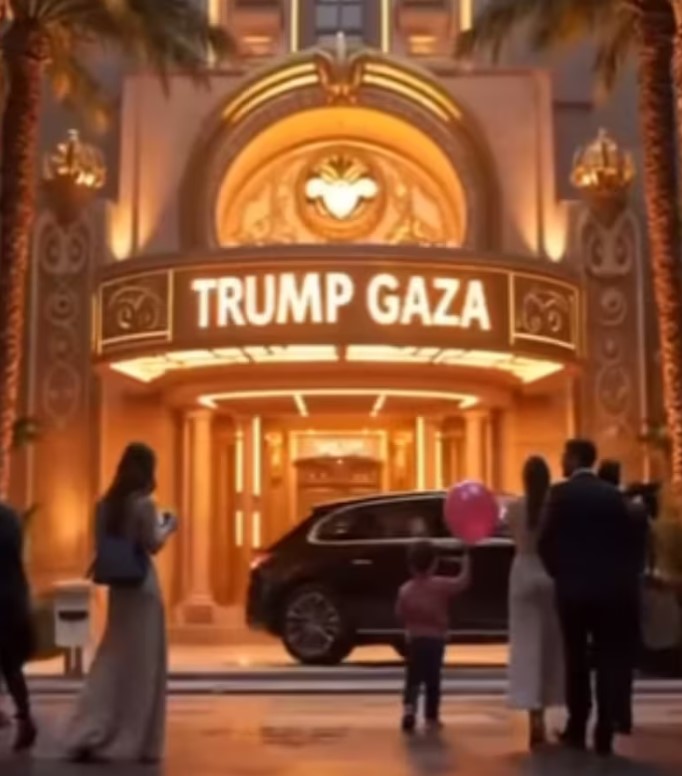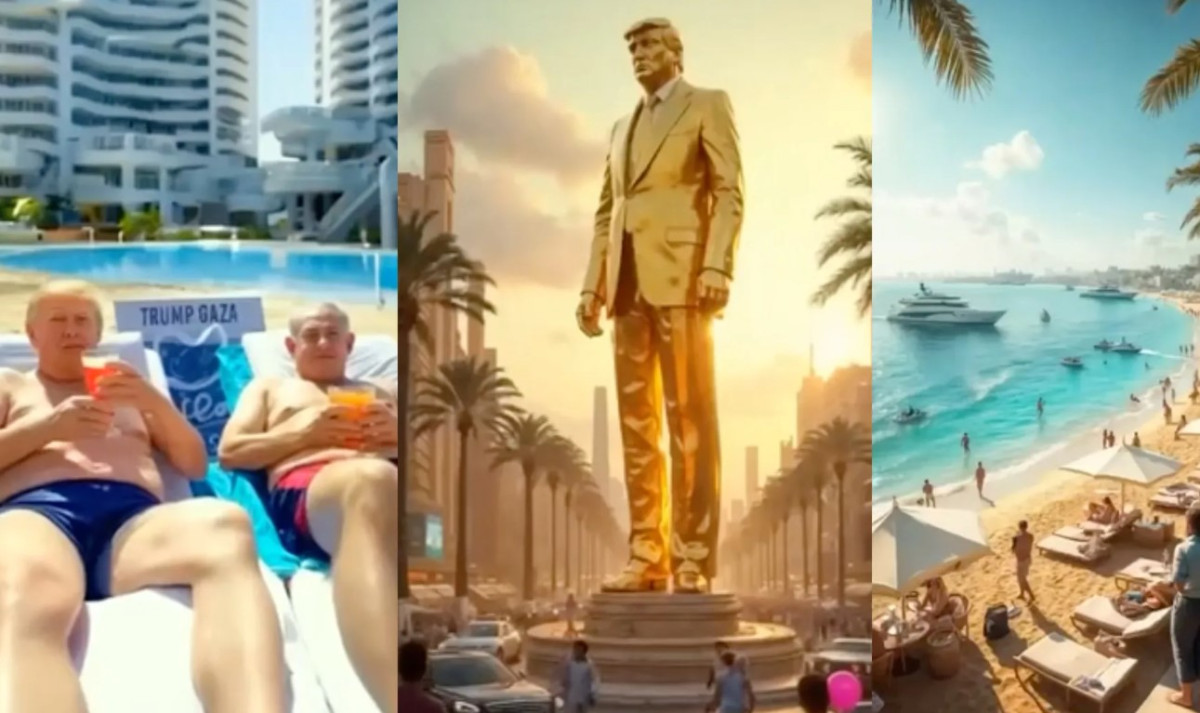Trump Gaza AI Video Sparks Controversy on Truth Social
A recent AI-generated video posted by former U.S. President Donald Trump has sparked widespread criticism from Arabs and Muslims both in the United States and abroad. The video, which imagines the war-torn Gaza Strip transformed into a glitzy luxury resort named “TRUMP GAZA,” has been condemned as tone-deaf, offensive, and politically provocative.

The video, shared on social media, features a surreal and exaggerated vision of Gaza, portraying it as a lavish destination where destruction is replaced with palm trees, opulent hotels, and entertainment venues. Many critics argue that the video trivializes the suffering of Palestinians and ignores the ongoing humanitarian crisis in the region.
The controversy comes just weeks after Trump suggested that the United States should take over Gaza and relocate Palestinians. His remarks, combined with the video’s depiction of a fantasy-like reconstruction, have drawn outrage from political leaders, activists, and everyday citizens who see it as a dismissal of Palestinian struggles.
This article explores the contents of the video, reactions from Gaza residents and U.S. Arab and Muslim leaders, and the broader implications of Trump’s rhetoric and AI-generated propaganda.
Contents
Content of the Video
The AI-generated video presents a highly stylized and exaggerated reimagining of Gaza, blending satire with political messaging. Some of the most controversial elements include:
Trump Gaza AI Video
Trump and Israeli Prime Minister Benjamin Netanyahu Sunbathing in Gaza: This imagery suggests a complete transformation of the war-torn region into a paradise catering to global elites.
“TRUMP GAZA” Resort: The video envisions Gaza as a high-end tourist destination with extravagant resorts and casinos, completely disconnected from the reality of destruction and displacement.
Children Emerging from the Rubble: In a particularly jarring scene, children who have seemingly survived bombings and devastation are seen running joyfully into a world of luxury and wealth. Critics argue that this minimizes the suffering of Palestinian families.
A Towering Golden Statue of Trump: The presence of a massive Trump statue in the center of the resort symbolizes his brand of self-promotion and political dominance.
Men in Drag and Belly Dancers: The inclusion of men dressed in bikinis and a scene featuring Trump enjoying a belly dancer has been perceived as an attempt at humor, but many find it culturally insensitive.
Elon Musk Showered with U.S. Dollars: The depiction of a figure resembling Musk being rained on with American currency further reinforces the video’s theme of extreme wealth and capitalist exploitation.
While Trump and his supporters may view the video as a bold statement on “rebuilding Gaza” in his vision, critics argue that it is an insensitive and misguided representation of a deeply complex and tragic situation.
Reaction from Gaza Residents
For many Palestinians living in Gaza, the video is not just offensive it is deeply disconnected from their reality. The Gaza Strip has been subjected to repeated military conflicts, economic hardship, and a lack of basic necessities. Electricity, clean water, and medical supplies remain scarce, and much of the region has been reduced to rubble due to ongoing Israeli airstrikes.

Despite the limited internet access in Gaza, some residents who managed to view the video expressed their outrage. Anas Baba, an NPR producer based in Gaza, showed the video to several young Palestinians, including 20-year-old Mohamed Abdelrahman. His response was unequivocal:
“We won’t be lured by a few statues and money, leave us alone and let us rebuild our homes by ourselves.”
This sentiment reflects the deep frustration among Palestinians who feel that their suffering is being used as political entertainment. Rather than addressing the urgent humanitarian crisis, the video presents an unrealistic, almost dystopian vision that ignores the voices of those directly affected.
Response from U.S. Arab and Muslim Leaders
The backlash against the video has not been limited to Gaza. Arab and Muslim leaders in the United States have also condemned it as offensive and counterproductive to peace efforts.

Faye Nemer, CEO and Founder of the MENA (Middle East and North Africa) American Chamber of Commerce in Dearborn, Michigan, voiced her disappointment in a statement to NPR. While Nemer had previously supported Trump and voted for him in November, she strongly criticized the video, calling it:
“Offensive and counterproductive to peace talks.”
She further urged Trump to remove the video and issue a reconciliatory statement. Her reaction highlights the growing divide between Trump’s Arab and Muslim supporters and his increasingly controversial rhetoric regarding the Middle East.
Many other Muslim and Arab advocacy groups in the U.S. have echoed Nemer’s concerns. The Council on American-Islamic Relations (CAIR) has called for Trump to take responsibility for the inflammatory nature of the video, stating that it “distorts reality and disrespects the pain of millions of Palestinians.”
Broader Implications
The controversy surrounding the “Trump Gaza” video raises several important questions about political propaganda, the role of AI-generated media, and the future of U.S.-Middle East relations.
Trump’s Position on Gaza and Palestine
The video comes at a time when Trump has openly suggested that the U.S. should take over Gaza and relocate Palestinians.
Such remarks, combined with the video, reinforce the perception that he sees Gaza’s future as a U.S.-controlled business venture rather than a humanitarian crisis that requires international intervention.
AI-Generated Political Propaganda
The video highlights the growing use of artificial intelligence in political messaging.
AI-generated content can blur the lines between satire, propaganda, and disinformation, making it even more challenging for audiences to distinguish reality from fiction.
If left unchecked, AI-driven political media could become a dangerous tool for shaping public perception through misleading narratives.
Impact on U.S. Domestic Politics
Trump’s video has the potential to further alienate Arab and Muslim voters in the U.S., many of whom have already expressed concerns over his policies toward the Middle East.
While some of his supporters may see the video as humorous or visionary, it risks deepening the divide between Trump’s base and communities that are directly affected by U.S. foreign policy in the region.
Implications for Israel-Palestine Relations
At a time when tensions in Gaza remain high, the video’s portrayal of a “fantasy Gaza” is likely to exacerbate anger among Palestinians and their allies.
It also raises concerns about how U.S. leaders approach peace talks whether through diplomacy or through controversial, provocative messaging.
The AI-generated “Trump Gaza” video has ignited global controversy, drawing criticism from Palestinians, Arab Americans, and peace advocates alike. While the video’s intent may have been to depict a grand vision of redevelopment, it has instead been seen as an out-of-touch, offensive portrayal of a deeply suffering population.
Reactions from Gaza residents like Mohamed Abdelrahman underscore the frustration and pain felt by those on the ground. Meanwhile, U.S.-based Arab and Muslim leaders, including Trump supporters like Faye Nemer, have called for the video’s removal and a more reconciliatory approach to discussing Gaza’s future.
Ultimately, the video raises significant concerns about the ethics of AI-generated political content and the future of political messaging. As technology continues to evolve, so too must the responsibility of political figures to ensure their messaging does not trivialize real human suffering.
As for Trump, whether he acknowledges the backlash and responds to the criticism remains to be seen. However, one thing is certain the debate surrounding Gaza, Palestine, and U.S. involvement in the Middle East is far from over.
Hot News -Chris Brown and Frank Ocean Fight Video: A Look Back
Los Amo Padres Original Video and Its Troubling Impact
Lily Lang Video and The Viral Controversy
Wendy Ortiz Fight Video and Public Reactions
Atlanta Airport Fight Video and Chaos at Hartsfield-Jackson
Funky Town Gore Video and Most Disturbing
Salma Flores Viral Video and What Happened

